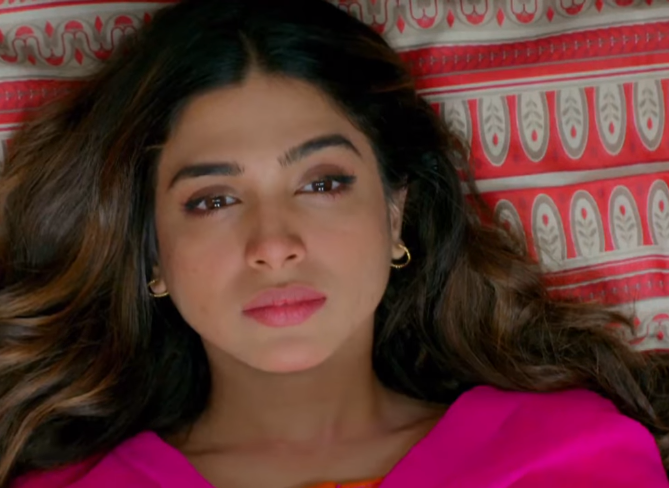Mental health is not a topic that has been actively depicted on Pakistani television often. However, as of late, writers are tackling different subjects in an effort to highlight issues and social taboos. We saw this recently with “Ishq Zahe Naseeb,” which depicted dissociative identity disorder, and now Hum TV presents “Saraab.” The teasers of “Saraab” caught the attention of viewers as it seemed to depict a female lead with schizophrenia. Written by Edison Idrees and directed by Mohsin Talat, the show brings together Sami Khan and Sonya Hussyn again, a favorite pairing of Pakistani drama fans.
Episode 1 takes off in an impressive way. Sami Khan and Sonya Hussain are not only a beloved pairing, but are also two stellar actors. Sonya Hussyn proves with each show how underrated of an actress she has been and is finally getting her due. Hoorain is a character that we immediately see as struggling with something, though it’s not clear what that something is initially. The red flags begin to show up early on, particularly once Hoorain and Asfandyar come face to face. It’s interesting to watch their exchange with the knowledge of knowing things aren’t alright on Hoorain’s end. While Asfandyar, in his innocence, takes Hoorain’s cryptic words to mean she’s hopelessly besotted with him and always thinking about him, the audience knows better. It’s fascinating how one can be so deeply troubled and yet others around them be unaware as to the extent. Hoorain’s psyche is revealed as far worse than viewers could imagine when her father catches her talking to Asfandyar on a phone which has been dead for weeks. Hoorain admits to being afraid constantly, she is unable to do simple things like make tea and has aggressive reactions when challenged. The reaction her parents have towards their daughter is that of fear and shock and it’s clear they do not know how to handle the situation when her mother decides to take Hoorain to a “Baba” to remove black magic. Sonya Hussyn does a wonderful job of portraying this character as deeply complexed and troubled while outwardly attracting not only Asfandyar, but also the attention of her sister’s brother-in-law who wants to propose.
Asfandyar is played by Sami Khan and this role gives him a lot of scope and room to play around as an actor. While Asfandyar is your general, good-hearted lover-boy, the Asfandyar we see interacting with Hoorain at night is a very different Asfandyar, one with a darker demeanor who teases Hoorain. At one point, Hoorain tells Asfandyar that she’s afraid of him, which leaves him surprised. The interactions between Hoorain and Asfandyar leave the viewer feeling as confused as Asfandyar, because it becomes murky as to who Hoorain is interacting with at what time – is he really there? And this works in the show’s favor, because it’s clear we are supposed to have that window into Hoorain’s mind. Sami Khan is doing a wonderful job and it will be exciting to see how Asfandyar’s relationship with Hoorain grows from here, especially when Namal (Nazish Jahangir) is also interested in Asfandyar.
http://thebrownidentity.com/2020/08/19/mushk-episode-1-imran-ashrafs-show-treads-a-different-path/
There’s something hauntingly beautiful about “Saraab,” while making one deeply uncomfortable and concerned for the lead characters. This is a brave choice of topic for the makers and as of the first episode, it’s a strong start. Those involved with the show have gone on record to say that the show aspires to tackle social taboos and discuss the types of issues associated with mental health that are not acknowledged in Pakistan. It is true that in South Asian society, a general brush is used to paint individuals as “paagal” (crazy) rather than get to the bottom of what the problem is and seek appropriate treatment. One can only hope this show does a good job of not only presenting a believable, solid story, but also taking the time to educate viewers – and hopefully, broaden mindsets.
